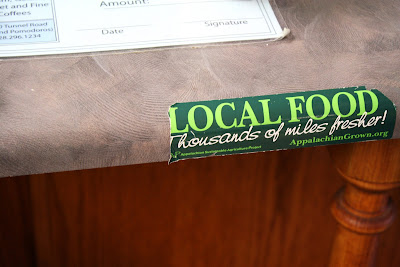Flexitarianism
If someone decided to give out an award for the greatest guilt
complex – I am sure I would win….and then I would feel terrible for winning.
Throughout the years, I’ve grown to recognize this in
myself. True, it often keeps me from being the best version of myself. Yet, I
have come to realize, when used for good – not evil – my tendency
towards feeling guilty about everything can be appropriately channeled to being
healthily convicted.
I’ve seen this the most in my passion towards taking care of
the environment, particular in what we put in our mouths. Somehow I find motivation to keep thinking and
searching for new ways to care for the land we live on. (Okay, yeah I am no
expert. But this motivation often causes me to “act strangely” – like “hording”
trash because I can recycle it later at home, or digging something out of the
trash at work after someone threw away a recyclable item. I am incapable of leaving it there).
Obsessive? Maybe. But I am tired of not caring what type of
world we are leaving for those who come after us.
This guilt complex and/or convictions are often very frustrating.
For instance, last night, I was waiting for my sister to finish checking out at
Dillon’s, and, like usual, she was the only one I saw using her own bags. It’s such an easy thing to do and I often get
frustrated at this apathy Americans have towards doing little things that make
a huge impact. We are so lazy. (True, I am not perfect and have forgotten to bring my own bags sometimes, but still it still is frustrating. In South Africa, you have to pay for all the plastic “packets”
you use at the grocery store. Imagine if that was the norm here)? This, to me,
is the same thing as people throwing away aluminum cans – the easiest thing to recycle.
Really? Come on.
One of the biggest issues my guilt complex and healthy convictions constantly fight over is the fact that I have not yet made the leap to being a full-fledge vegetarian. I know a ton of reasons why I should not eat that CAFO (Concentrated Animal Feeding Operation) beef, but sometimes I still eat that burrito and find it to be delicious. Not always. But sometimes...
My guilt complex tells me I know better while my healthy convictions tells me at least I am making an effort to be aware of what I am eating - even if I am not eating 100% local all of the time. It's a tough battle.
However, I have come to a conclusion that I feel pretty good about. I am officially a flexitarian.
This is not a huge announcement, and not even anything new, especially to those of you who have been faithfully reading my blog. In fact, I have been a flexiarian ever since my senior year at Bluffton. And actually this is really similar to being a "locavore."
A lot of this decision to be okay with not being a "straight up vegetarian" came from this relation - if I switch from beef to tofu, it does not mean I would doing the environment a huge favor (maybe a little bit of one, but it is not one without environmental impact. After all, considering where I live right now, I believe it is safe to assume it would take a similar amount of foil fuel to feed me on a soy diet as it would with beef).
As I keep mentioning, I recently read Barbara Kingsolver's book, Animal, Vegetable, Miracle, and again, I like what she has to say - particularly concerning vegetarianism for the sake of animal cruelty alone.
But meat, poultry, and eggs from animals raised on open pasture are the traditional winter fare of my grandparents, and they serve us well here [Virginia] in the months when it would cost a lot of fossil fuel to keep us in tofu. Should I overlook the suffering of victims of hurricanes, famines, and wars brought on this world by profligate fuel consumption? Bananas that cost a rain forest, refrigerator-trucked soy milk, and pre washed spinach shipped two thousand miles in plastic containers do not seem cruelty free, in this context. A hundred different paths may lighten the world's load of suffering. Giving up meat is one path; giving up bananas is another. The more we know about our food system, the more we are called into complex choices. It seems facile to declare one single forbidden fruit, when humans live under so many different trees.Kingsolver also points out that the often quoted plea for vegetarianism (about how it takes ten times as much land to make a pound of meat than grain) really only applies to land where rain falls in plenty and the soil is good. Those who do not live in these ideal conditions (which would be a lot of the world's poor) would starve without meat.
For me, it comes down to how and where things were raised. And I will continue to try and make better consumer choices as I keep this in mind. True, I am not eating 100% locally raised meats and veggies, but I would like to believe I am on my way, especially if my guilt complex continues to keep me on my toes.

Confession, sometimes when I'm at et cetera I will take things out of the recycling bins because even though they think it's unusable, I think I can do something with it. I've gotten some good things out of there.
ReplyDelete